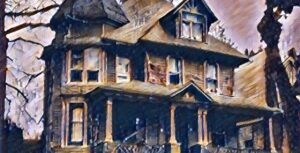It was an old-fashioned notion, but all she’d ever wanted. She was the one who found the place, a drafty old house that needed work, but with leaded-glass windows, built-in bookshelves, old-fashioned locks with big brass keys, cut-glass doorknobs like diamonds. It had good bones. New paint inside and out did everyone good. They’d pulled up carpets to reveal fir flooring, uneven and full of gaps, but too beautiful to cover. Even if it never got refinished. Even if it creaked and groaned underfoot.
They joked that it must be haunted. Then they got the furnace fixed. Not ghosts; only carbon monoxide. Still drafty and creaky, but not haunted.
Children put an end to renovations, but filled the many rooms with happy noise and love. Until things changed. When the marriage ended – messily, as they sometimes do – he took the cash, the jewelry, the rare books, the children. She kept the house.

She watched from her bedroom window as they drove away. Would the children be all right? Would she see them again? He was taking them to his mother’s house. They would be safe with Grandma.
When night fell, she left the bedroom and drifted aimlessly through the house, unable to settle down to anything. She flicked light switches on and off, touched doorknobs, closed curtains. When the phone rang, she picked it up but had no words to answer. She sobbed once and hung up. She forgot about food and gazed endlessly at the family portrait over the mantel. She memorized the children’s faces and tried to remember that time when they were happy. When she was.
A clunk in the night drew her to the kitchen. Graykitty stared at her with golden eyes and hissed. The children had named her that when they were small, and it stuck. It was a relief to meet something alive in the empty house, something that could see her. But why had they left their cat behind? Of course; Grandma was allergic. Those poor little ones, they must have missed their pet so much.
She opened the front door and the cat streaked out. Graykitty was an excellent mouser, so important in an old house. “You’ll be fine. I can’t leave.” Nor care for anything alive in her current state. The most she could do was open the door.
Keeping a house was no fun alone. It was something you did with someone; for someone. If she could only get into his head somehow; change his mind.
She was at the bedroom window again when he returned three days later. He was alone. She waited for him to come upstairs. She would change his mind and they would be together.
He came into the room and closed the door behind him. He didn’t even look at her when she hovered over him, watching. He had trash bags, rubber gloves, a face mask. The body had begun to attract flies; blood soaked through the throw rug into the floor. As he got to work, she turned the big brass key in the old-fashioned lock, then pulled it out and dropped it down a knothole in the floorboard. He turned at the sound. She rested her hands on his head. Now he saw her. He looked into her eyes and screamed as she sank her fingers through his skull.
She would change his mind. They would keep the house together. Forever.
This story previously appeared in the anthology See into the Dark, 2016.
Edited by Marie Ginga
Karen Eisenbrey (she/her) lives in Seattle, WA, where she leads a quiet, orderly life and invents stories to make up for it. Karen writes fantasy and science fiction novels, as well as short fiction and the occasional poem or song if it insists. Details at Karen Eisenbrey.

